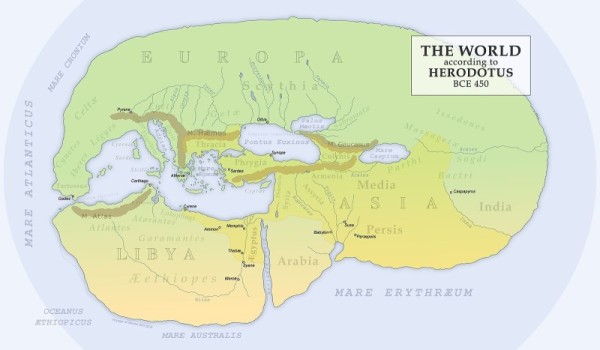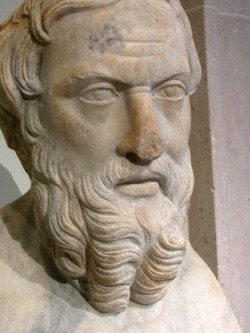Darius begins conquest; crosses to Europe. Persia’s overwhelming forces concentrated against Greece.

Translated by Lord Macaulay — our special project presenting the complete Herodotus with URLs for all of those people, places, events, and things which baffles and discourages modern readers.
Previously on Herodotus
83. While Darius was preparing to go against the Scythians and was sending messengers to appoint to some the furnishing of a land-army, to others that of ships, and to others the bridging over of the Thracian Bosphorus, Artabanos, the son of Hystaspes and brother of Darius, urged him by no means to make the march against the Scythians, telling him how difficult the Scythians were to deal with. Since however he did not persuade him, though he gave him good counsel, he ceased to urge; and Darius, when all his preparations had been made, began to march his army forth from Susa. Then one of the Persians, Oiobazos, made request to Darius that as he had three sons and all were serving in the expedition, one might be left behind for him: and Darius said that as he was a friend and made a reasonable request, he would leave behind all the sons. So Oiobazos was greatly rejoiced, supposing that his sons had been freed from service, but Darius commanded those who had the charge of such things to put to death all the sons of Oiobazos.
85. These then were left, having been slain upon the spot where they were: and Darius meanwhile set forth from Susa and arrived at the place on the Bosphorus where the bridge of ships had been made, in the territory of Chalcedon; and there he embarked in a ship and sailed to the so-called Kyanean rocks, which the Hellenes say formerly moved backwards and forwards; and taking his seat at the temple he gazed upon the Pontus, which is a sight well worth seeing. Of all seas indeed it is the most marvelous in its nature. The length of it is eleven thousand one hundred furlongs, and the breadth, where it is broadest, three thousand three hundred: and of this great Sea the mouth is but four furlongs broad, and the length of the mouth, that is of the neck of water which is called Bosphorus, where, as I said, the bridge of ships had been made, is not less than a hundred and twenty furlongs. This Bosphorus extends to the Propontis; and the Propontis, being in breadth five hundred furlongs and in length one thousand four hundred, has its outlet into the Hellespont, which is but seven furlongs broad at the narrowest place, though it is four hundred furlongs in length: and the Hellespont runs out into that expanse of sea which is called the Agean.
86. These measurements I have made as follows:—a ship completes on an average in a long day a distance of seventy thousand fathoms, and in a night sixty thousand. Now we know that to the river Phasis from the mouth of the Sea (for it is here that the Pontus is longest) is a voyage of nine days and eight nights, which amounts to one hundred and eleven myriads of fathoms; and these fathoms are eleven thousand one hundred furlongs. Then from the land of the Sindians to Themiskyra on the river Thermodon (for here is the broadest part of the Pontus) it is a voyage of three days and two nights, which amounts to thirty-three myriads of fathoms or three thousand three hundred furlongs. This Pontus then and also the Bosphorus and the Hellespont have been measured by me thus, and their nature is such as has been said: and this Pontus also has a lake which has its outlet into it, which lake is not much less in size than the Pontus itself, and it is called “Maiotis” and “Mother of the Pontus.”

CC BY-SA 2.0 image from Wikipedia.
87. Darius then having gazed upon the Pontus sailed back to the bridge, of which Mandrocles a Samian had been chief constructor; and having gazed upon the Bosphorus also, he set up two pillars by it of white stone with characters cut upon them, on the one Assyrian and on the other Hellenic, being the names of all the nations which he was leading with him: and he was leading with him all over whom he was ruler. The whole number of them without the naval force was reckoned to be seventy myriads including cavalry, and ships had been gathered together to the number of six hundred. These pillars the Byzantians conveyed to their city after the events of which I speak, and used them for the altar of Artemis Orthosia, excepting one stone, which was left standing by the side of the temple of Dionysos in Byzantion, covered over with Assyrian characters. Now the place on the Bosphorus where Darius made his bridge is, as I conclude, midway between Byzantion and the temple at the mouth of the Pontus.
88. After this Darius being pleased with the floating bridge rewarded the chief constructor of it, Mandrocles the Samian, with gifts tenfold; and as an offering from these Mandrocles had a painting made of figures to present the whole scene of the bridge over the Bosphorus and king Darius sitting in a prominent seat and his army crossing over; this he caused to be painted and dedicated it as an offering in the temple of Hera, with the following inscription:
Bosphorus having bridged over, the straits fish-abounding, to Hera
Mandrocleës dedicates this, of his work to record;
A crown on himself he set, and he brought to the Samians glory,
And for Darius performed everything after his mind.
89. This memorial was made of him who constructed the bridge: and Darius, after he had rewarded Mandrocles with gifts, passed over into Europe, having first commanded the Ionians to sail into the Pontus as far as the river Ister, and when they arrived at the Ister, there to wait for him, making a bridge meanwhile over the river; for the chief of his naval force were the Ionians, the Aiolians and the Hellespontians. So the fleet sailed through between the Kyanean rocks and made straight for the Ister; and then they sailed up the river a two days’ voyage from the sea and proceeded to make a bridge across the neck, as it were, of the river, where the mouths of the Ister part off. Darius meanwhile, having crossed the Bosphorus on the floating bridge, was advancing through Thrace, and when he came to the sources of the river Tearos he encamped for three days.
– Herodotus, Book IV
| <—Previous | Master List | Next—> |
Herodotus made his living by being interesting. In a world where most people did not read and could not afford to buy a book even if they could, they would pay to listen to Herodotus recite from his books. They would not pay to be bored. In that world, the names that populate his stories would have some general familiarity to his audience. Their obscurity to us is a barrier that this series seeks to break down.
MORE INFORMATION
MAP LIBRARY
Because of lack of detail in maps as embedded images, we are providing links instead, enabling readers to view them full screen.

Leave a Reply
You must be logged in to post a comment.